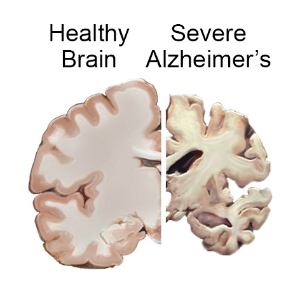China approves Alzheimer’s drug, GV-971 or Oligomannate 06/11/2019 – Posted in: Daily News – Tags: aducanumab, Alzheimer, Dementia, Dr. Alois Alzheimer, Food and Drug Administration
Alzheimer’s drug
For: Preliminary & Mains
Topics covered:
- About Alzheimer’s drug?
- What is Alzheimer’s and what are its symptoms and causes?
- What is Dementia?
News Flash
China announced that a new drug, meant to potentially treat Alzheimer’s disease, will be available to Chinese patients very soon.
What is Alzheimer’s?
Alzheimer’s disease is a progressive brain disorder that typically affects people older than 65. The disease destroys brain cells and nerves, and disrupts the message-carrying neurotransmitters. Eventually, a person with Alzheimer’s loses the ability to perform day-to-day activities.
Symptoms
Symptoms include memory loss, difficulty in completing familiar tasks, confusion with time or place, problems in speaking and writing, decreased or poor judgment, and changes in mood and personality.
Cause
Alzheimer’s disease is the most common cause of dementia among older adults.
Dementia
Dementia is a syndrome and not a disease in itself, and whose symptoms include loss of memory, thinking skills, problems with language, changes in mood and deterioration in behaviour. The causes of dementia can vary, depending on the types of brain changes that may be taking place.
The Chinese drug
- The new drug called GV-971 or “Oligomannate”, it is a seaweed-based drug.
- It has been jointly developed by the Shanghai Institute of Materia Medica and the Ocean University of China and Green Valley Pharmaceutical Company Ltd.
- “Oligomannate” has received approval from China’s National Medical Products Administration (NMPA).
- The new drug can be used for the treatment of ‘mild to moderate Alzheimer’s disease (AD) and improving cognitive function’.”
Background
Alzheimer’s disease is named after Dr. Alois Alzheimer. In 1906, Dr. Alzheimer noticed changes in the brain tissue of a woman who had died of an unusual mental illness. Her symptoms included memory loss, language problems, and unpredictable behavior. After she died, he examined her brain and found many abnormal clumps (now called amyloid plaques) and tangled bundles of fibers (now called neurofibrillary, or tau, tangles). These plaques and tangles in the brain are still considered some of the main features of Alzheimer’s disease.
Another feature is the loss of connections between nerve cells (neurons) in the brain. Neurons transmit messages between different parts of the brain, and from the brain to muscles and organs in the body.
Important Information
Recently, in the US, Food and Drug Administration approves “aducanumab”, a drug that could slow down the clinical decline in patients in the early stages of Alzheimer’s.
Source: Indian Express
READ MORE DAILY NEWS
- National Health Profile report 2019
- No signing of the RCEP
- 14th East Asia Summit
- Assam Project for Forest and Biodiversity Conservation (APFBC)
- Meghalaya Residents Safety and Security Act 2016
- Nanak Naam Lewa Sangat (Nanakpanthi)
- National Research Institute of Unani Medicine for Skin Disorders (NRIUMSD)
You are on the Best Online IAS preparation platform. You are learning under experts.
We are present on Facebook- Diligent IAS, LinkedIn- Diligent IAS, YouTube- Diligent IAS, Instagram- Diligent IAS. Get in touch with us.

